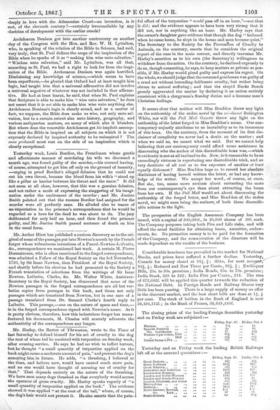. Mr. Harley, the Rector of Tfirweston, wrote to the
Times of last Saturday to defend himself for his act of cruelty to the dog the root of whose tail he anointed with turpentine on Sunday week, -after evening service. He says he had no wish to inflict torture, but he thought "a small quantity of turpentine applied on the back might cause a moderate amount of pain," and prevent the dog's -annoying him in future. He adds, "a thrashing, I believed at the time, and believe now, would have caused much more pain, -and no one would have thought of accusing me of cruelty for that." That depends entirely on the nature of the thrashing. We have seen many dogs thrashed so that everybody would accuse the operator of gross cruelty. Mr. Harley speaks vaguely of "a small quantity of turpentine applied on the back." The evidence showed it was applied "at the root of the tail," where, of course, the dog's hair would not protect it. He also asserts that the pain- ful effect of the turpentine "would pass off in an hour,"—not that it did; and the evidence appears to have been very strong that it did not, nor in anything like an hour. Mr. Harley says that the owner's daughter gave evidence that though the dog "hallooed when he came home, he slept in the house and soon became quiet." The Secretary to the Society for the Prevention of Craelty to Animals, on the contrary, asserts that he considers the original report of the case in the main correct, and directly traverses Mr. Harley's assertion as to his own (the Secretary's) willingness to withdraw from the action. On the contrary, he declined expressly to do so, though consenting, he gays, to keep matters as private as pos- sible, if Mr. Harley would plead guilty and express his regret. On the whole, we should judge that the reverend gentleman was guilty of a cruel act without intending deliberate cruelty, but rather being obtuse to animal suffering ; and that the stupid Backs Bench grossly aggravated the matter by declaring it an action entirely consistent with a clergyman's Sunday duties and a humane man's Christian feelings.






























 Previous page
Previous page